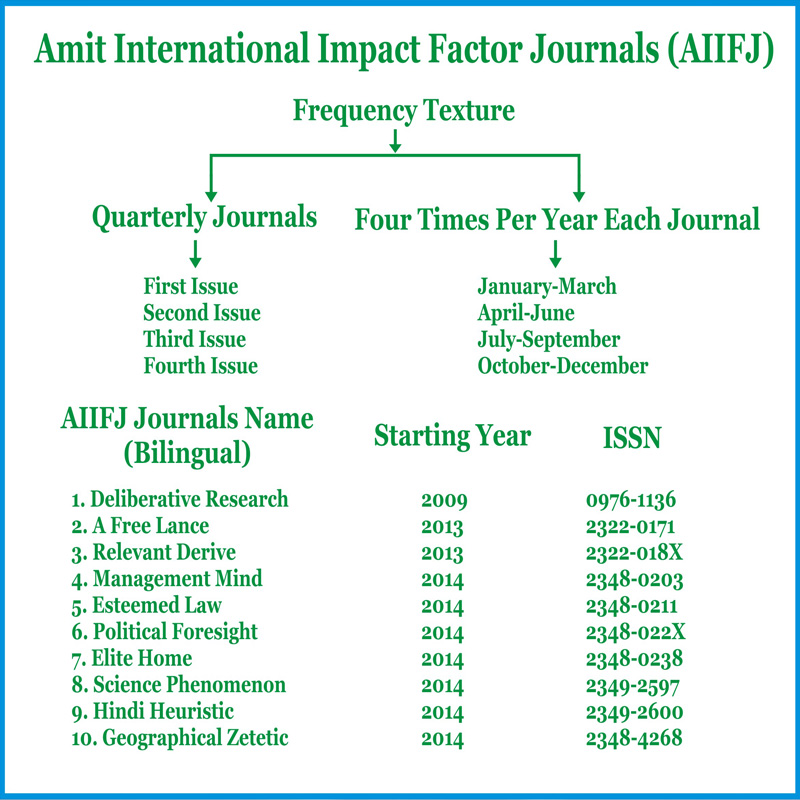On receiving a request to review
Why should I review?
Peer review is an essential component of formal scholarly communication and lies at the heart of the scientific method. Reviewing papers is part of belonging to the scientific community. Being sent a paper to review allows you a “sneak preview” into some research in your specific interest area or a closely allied field. It allows you to have some impact on what is being published in your discipline. For more experienced scientists, it is a way of mentoring other scientists. For younger researchers, it is a way to learn more about your discipline, and when you are asked to review a paper, it is an acknowledgment of your importance in the community of scientists. AIIFJ shares the commonly held view that all scholars who wish to contribute to publications have an obligation to do a fair share of reviewing.
Are there consequences for refusing to review a paper?
No. However, please inform your editor by return e-mail if you are not able to complete the review.
What if I feel there is a conflict of interest in my commenting on the research?
Reviewers should not consider manuscripts in which they have conflicts of interest resulting from competitive, collaborative, or other relationships or connections with any of the authors, companies, or institutions connected to the papers. In such a case a reviewer should contact the editor and excuse him/herself from the review process for that particular paper.
What if the language, grammar or structure of the paper is very bad?
AIIFJ encourages authors to polish their manuscript as much as possible before submission. We also work with our editors to try to ensure that papers with very poor English are not sent to reviewers. If, however, a paper with poor English has made it through the screening process, and if the errors make the article extremely difficult (or impossible) to understand, the paper should be returned to the editor with the request that the author have the material edited for content before re-submitting it for peer review.
What if the paper does not follow the journal’s layout, format and general style?
Authors are required to adhere to the journal’s Guide for Authors, which includes manuscript presentation. If the difference is extreme and the editor has not mentioned this issue in the request to review, you may wish to contact your editor to discuss it. Otherwise, you should note this in your review. If the paper is otherwise good, the editor may choose to overlook the formatting issues (for example, if the author comes from outside the discipline but has something valuable to convey to the readers of this journal). Other times, editors may ask the author to restructure the paper before publication.
What if I don’t feel qualified to review the research?
Any selected referee who feels unqualified to review the research reported in a manuscript should notify the editor and excuse him/herself from the review process. This should be done as soon as possible by return email.
Is the review process anonymous?
Different journals have different approaches: some journals use a single blind reviewing process, some use a double blindsystem, and still others have an open approach. Different approaches are appropriate for different subject areas, and also depend upon the culture of the discipline. You should contact your editor if you have any further questions about the process employed by the journal for which you are reviewing.
Completing the review
How long do I have to complete the review? Is there a deadline? What if I’m running late?
Deadlines for reviews vary per journal. The editors will provide information on deadline expectations with the review request.
Editors appreciate being informed that you have received their request within a day or two and are able to complete the review. If you feel the review will take you longer to complete than normal, please contact the editor to discuss the matter. The editor may ask you to recommend an alternate reviewer, or may be willing to wait a little longer (e.g., if the paper is highly specialized and reviewers are difficult to find). As a general guideline, if you know you will not be able to complete a review within the timeframe requested, you should decline to review the paper. It is important that you keep the editor informed if the review is taking longer than expected.
Who can I ask for help if I need it?
If you have queries relating to the content of the paper, please contact the journal editor or the editorial office. For technical issues relating to our submission system.
Can I request the input of my colleagues?
Papers sent to you for review are confidential; however, requesting the opinion of a single colleague may be appropriate in some circumstances. Please consult your editor about this.
Can I refer the review to a post-graduate student?
Check with your editor. In general, if you feel the student is suitably qualified, this will be acceptable. If the review is referred to the student, he or she should communicate directly with the editor.
What if I have issues with the research from an ethical perspective?
This is a vital part of the referee’s remit; you should contact the editor without delay to discuss any concerns.
I feel I have seen this paper (or a large part of it) elsewhere before – what should I do?
Any claim that an observation, derivation or argument has been previously published should be accompanied by a relevant citation. A reviewer should call the editor’s attention to any substantial similarity or overlap between the manuscript under consideration and any other published paper of which they have personal knowledge.

